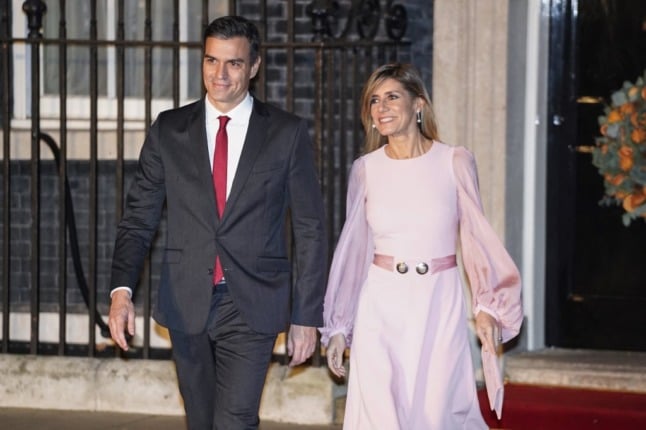Spain's Prime Minister to star in his own documentary series

Spanish Prime Minister Pedro Sánchez will be the protagonist of a new documentary series which will look at the inner workings of the Spanish government and offer a glimpse into the daily and personal life of the head of government.
Titled La Moncloa, in reference to the Spanish equivalent of the White House or 10 Downing Street, the four-part docuseries is reportedly in the middle of shooting, with filmmakers following Sánchez and his team of staff as they carry out their daily routine in government.
According to the two production studios behind the project, Secuoya Studios and The Pool, the documentary will "show two facets, the institutional side and the human side".
It reportedly won’t consist of "purely political or ideological arguments" but rather be “an observational story, which will focus on the more personal and everyday aspects” of life for those in the Spanish government.
A release date for the docuseries has not yet been announced, nor the streaming platform or TV channel on which it will air, but the producers have advanced that the narrative and visual proposal will transit between documentary and factual cinema.
Prime Minister Pedro Sánchez, who is currently focusing on the war in Ukraine, has not offered any comment on his participation in the project so far.
The documentary will be directed by Curro Sánchez Varela, the son of famed Spanish guitarist Paco de Lucía, who has extensive experience directing short films, commercials and music videos.
His 2015 documentary about his father - La Búsqueda - won him Spain’s Goya Award for Best Documentary.
"We’re living through strange times, so having the possibility of having such transparent, free and honest access into the day-to-day of the Presidency of Spain’s Government makes us appreciate more than ever the fact that we’re living in a democratic country, in which its citizens are guaranteed their freedoms," Varela is quoted as saying by radio station Onda Cero.

Sánchez and his wife María Begoña Gómez Fernández outside 10 Downing Street in London in 2019. (Photo by Niklas HALLE'N / AFP)
Even though Sánchez will be one of the main protagonists of the series, Varela says the project is also about "honouring and giving prestige to the team of workers who, in many cases, have been working for more than four decades at the service of different prime ministers in La Moncloa.
Sánchez, who was born in Madrid in 1952, is the head of Spain’s socialist PSOE party and has been Prime Minister since 2018. He is married and has two daughters.
Referred to as ‘Mr Handsome’ in the British and US press, Pedro Sánchez has won admirers around the world for his good looks, which may help the documentary series get some attention overseas.
Comments
See Also
Titled La Moncloa, in reference to the Spanish equivalent of the White House or 10 Downing Street, the four-part docuseries is reportedly in the middle of shooting, with filmmakers following Sánchez and his team of staff as they carry out their daily routine in government.
According to the two production studios behind the project, Secuoya Studios and The Pool, the documentary will "show two facets, the institutional side and the human side".
It reportedly won’t consist of "purely political or ideological arguments" but rather be “an observational story, which will focus on the more personal and everyday aspects” of life for those in the Spanish government.
A release date for the docuseries has not yet been announced, nor the streaming platform or TV channel on which it will air, but the producers have advanced that the narrative and visual proposal will transit between documentary and factual cinema.
Prime Minister Pedro Sánchez, who is currently focusing on the war in Ukraine, has not offered any comment on his participation in the project so far.
The documentary will be directed by Curro Sánchez Varela, the son of famed Spanish guitarist Paco de Lucía, who has extensive experience directing short films, commercials and music videos.
His 2015 documentary about his father - La Búsqueda - won him Spain’s Goya Award for Best Documentary.
"We’re living through strange times, so having the possibility of having such transparent, free and honest access into the day-to-day of the Presidency of Spain’s Government makes us appreciate more than ever the fact that we’re living in a democratic country, in which its citizens are guaranteed their freedoms," Varela is quoted as saying by radio station Onda Cero.

Even though Sánchez will be one of the main protagonists of the series, Varela says the project is also about "honouring and giving prestige to the team of workers who, in many cases, have been working for more than four decades at the service of different prime ministers in La Moncloa.
Sánchez, who was born in Madrid in 1952, is the head of Spain’s socialist PSOE party and has been Prime Minister since 2018. He is married and has two daughters.
Referred to as ‘Mr Handsome’ in the British and US press, Pedro Sánchez has won admirers around the world for his good looks, which may help the documentary series get some attention overseas.
Join the conversation in our comments section below. Share your own views and experience and if you have a question or suggestion for our journalists then email us at [email protected].
Please keep comments civil, constructive and on topic – and make sure to read our terms of use before getting involved.
Please log in here to leave a comment.